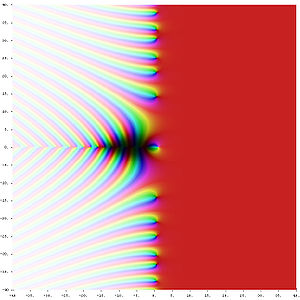
In mathematics, analytic number theory is a branch of number theory that uses methods from mathematical analysis to solve problems about the integers.[1] It is often said to have begun with Peter Gustav Lejeune Dirichlet's 1837 introduction of Dirichlet L-functions to give the first proof of Dirichlet's theorem on arithmetic progressions.[1][2] It is well known for its results on prime numbers (involving the Prime Number Theorem and Riemann zeta function) and additive number theory (such as the Goldbach conjecture and Waring's problem).
- ^ a b Apostol 1976, p. 7.
- ^ Davenport 2000, p. 1.